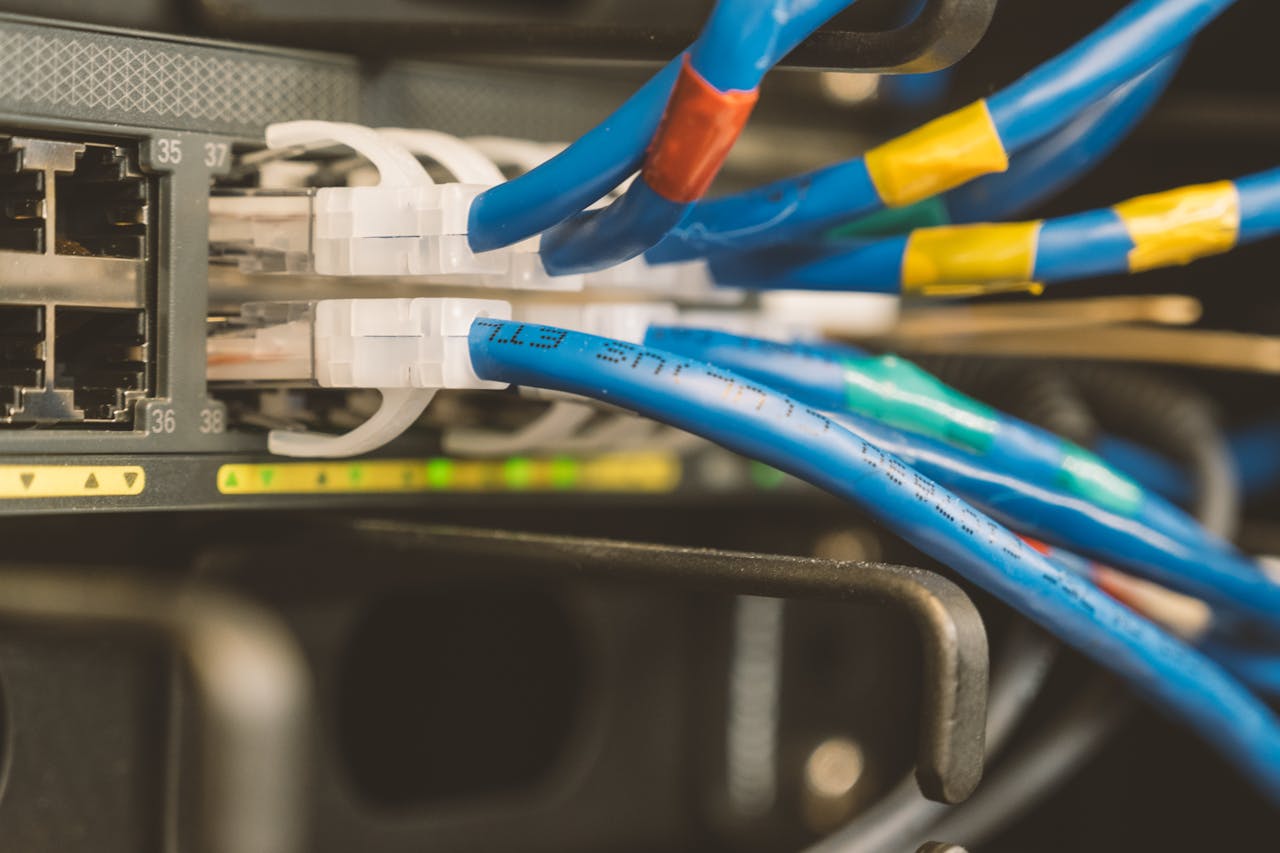How is the Business Internet Changing Financial Services?
-
January 23, 2025
-
8 min read

The financial services industry is undergoing a remarkable transformation, driven by the rapid evolution of fintech internet technologies. As connectivity becomes faster, more secure, and increasingly integral to operations, financial institutions are reimagining how they engage with customers, manage data, and deliver innovative solutions.
From reshaping customer experiences to enabling smarter decision-making, the intersection of internet advancements and financial services is unlocking new opportunities and challenges. This blog gets into the profound impact of these changes, diving into how they are reshaping the industry and what it means for both businesses and consumers.
Digital Transformation in Financial Services
Digital transformation in financial services refers to the adoption of advanced digital technologies to enhance operations, improve customer experiences, and drive innovation. Fintech Internet, cloud computing, and APIs are key enablers, allowing institutions to offer real-time services, optimise processes, and reduce costs.
Artificial intelligence (AI) and machine learning (ML) power predictive analytics for fraud detection, personalised financial advice, and risk assessment.
Traditional banking models are being replaced by digital-first solutions like mobile banking apps and automated investment platforms. Additionally, blockchain technology is streamlining transaction processing and enhancing security.
Financial institutions that invest in digital transformation not only stay competitive but also address evolving customer expectations for speed, convenience, and seamless multi-channel experiences.
The Rise of FinTech and its Internet-Driven Evolution
FinTech has introduced a revolutionary shift in financial services, enabled by the power of the internet. Its evolution can be understood through several key aspects:
Breaking Traditional Barriers
FinTech Internet removes the reliance on physical branches and manual operations, which often limit accessibility and efficiency. By moving processes online, it makes sure that financial services reach a broader audience, including underserved communities. This transformation reduces overhead costs for institutions and provides faster, more convenient solutions for users.
Internet-Enabled Payment Systems
Digital payment platforms have redefined transactions by offering secure and near-instant payments, both domestically and internationally. These systems simplify processes for individuals and businesses, replacing the need for cash or physical infrastructure. They also provide a foundation for integrating advanced features like automated invoicing and real-time payment tracking.
Peer-to-Peer Lending Solutions
Platforms that connect borrowers and lenders directly have reduced dependence on traditional banking intermediaries. This approach enhances transparency, offers competitive interest rates, and caters to individuals or small businesses that might lack access to conventional credit channels.
Blockchain and Decentralised Finance (DeFi)
Blockchain technology powers decentralised systems, creating secure and transparent ecosystems. Digital assets, smart contracts, and decentralised applications minimise reliance on third parties, lowering costs and increasing operational speed.
Open Banking and Collaboration
Open banking enables the secure exchange of customer data between financial institutions and third-party developers. This promotes innovation by allowing customised financial products to emerge, such as personalised credit plans or automated savings tools, all integrated seamlessly into existing platforms.
Impact on Customers and Institutions
The evolution of FinTech Internet increases accessibility, particularly in underserved markets, and delivers services tailored to individual needs. Institutions benefit from reduced costs, streamlined operations, and enhanced customer satisfaction through the integration of data-driven technologies.
This internet-powered transformation continues to address inefficiencies in traditional systems, ensuring a more inclusive and efficient financial ecosystem.
Internet-Enabled Innovations in Financial Services
The internet has catalysed groundbreaking innovations that are redefining financial services. By enabling seamless connectivity with corporate postpaid plans, real-time data access, and global reach, it serves as the backbone for modern financial systems.
Key innovations driven by the internet include:
Open Banking for Enhanced Collaboration
The internet powers open banking by enabling secure API connections between banks and third-party providers. This innovation promotes personalised services like automated savings plans and custom loan options, fostering transparency and competition to benefit end-users.
AI for Smarter Financial Solutions
Internet-driven AI systems enable real-time fraud detection, risk assessments, and tailored financial recommendations. These advancements reduce operational inefficiencies and improve customer trust by delivering hyper-relevant services.
Cloud Computing for Scalable Services
Cloud technology, supported by the internet, allows financial institutions to process vast amounts of data, deploy new services rapidly, and reduce infrastructure costs. This ensures scalability and agility in delivering services to meet growing demands.
IoT for Data-Driven Offerings
The Internet of Things integrates financial systems with smart devices, offering insights into consumer behaviour. These insights lead to innovative services like usage-based insurance and real-time financial tracking tools.
Real-Time Payments for Speed and Convenience
Internet-enabled payment systems process transactions instantly, supporting global trade and simplifying personal banking. These systems replace slow traditional methods, catering to the demand for speed and reliability.
Blockchain for Decentralisation
Blockchain uses the internet to create secure, decentralised systems, eliminating intermediaries, reducing costs, and enhancing transparency. It transforms financial operations, from asset transfers to contract automation.
These innovations highlight how the internet is not merely supporting financial services but actively driving their transformation into more efficient, customer-focused, and inclusive systems.
Shifts in Business Models
The internet has driven a fundamental shift in financial services business models by emphasising on digital-first and platform-based approaches. Traditional banking models, reliant on brick-and-mortar operations, are being replaced by agile, tech-enabled systems like embedded finance and decentralised finance (DeFi).
Embedded finance integrates financial services directly into non-financial platforms, such as e-commerce sites, which means seamless transactions and credit facilities. DeFi, powered by blockchain, eliminates intermediaries, enabling peer-to-peer transactions and open access. Subscription-based services and pay-as-you-go models are becoming popular, reducing upfront costs for users while creating recurring revenue streams for providers.
These shifts streamline operations and enable financial institutions to cater to diverse consumer needs, expand their reach, and maintain competitiveness in a digitising economy.
Enhanced Customer Experience
The FinTech Internet has dramatically improved customer experiences in financial services by offering seamless, omnichannel interactions. Customers can now:
- Access services anytime and anywhere using mobile apps, websites, or chatbots.
- Benefit from features like instant fund transfers, real-time account updates, and AI-powered virtual assistants, ensuring convenience and personalised support.
Financial institutions utilise big data and advanced analytics to:
- Understand customer behaviours and preferences more accurately.
- Provide tailored recommendations for savings plans, loans, and investment options.
Additional advancements include:
- Video Banking and Live Chat: These tools create human-like engagement, especially helpful for resolving complex queries.
- Gamification Features: Apps reward customers for achieving financial goals, making financial management more engaging.
These innovations create a frictionless, interactive, and customer-focused experience, building loyalty and trust while setting new industry standards.
Internet’s Role in Financial Inclusion
The FinTech Internet plays a transformative role in financial inclusion and enables access to banking and financial services for underserved populations. Digital platforms, mobile banking apps, and payment gateways rely on stable internet to deliver seamless, real-time services to remote and urban areas alike. These innovations are closing the gap for millions previously excluded from the formal financial system.
Airtel Office Internet supports these advancements with high-speed connectivity to ensure smooth operation of financial platforms without interruptions. Its low latency is critical for real-time services, and uninterrupted uptime means you enjoy consistent access even during high-demand periods.
With advanced security protocols, Airtel safeguards sensitive financial data, making it a reliable partner for scalable, inclusive financial services. The best part is 24/7 customer service to address connectivity concerns promptly.
Future Trends in Internet-Driven Financial Services
The financial services landscape is evolving rapidly, driven by innovations in internet technologies. Key trends shaping this future include:
- Artificial Intelligence (AI) in Finance: AI-powered internet platforms are enhancing fraud detection, offering hyper-personalised financial advice, and automating processes like loan approvals and customer service.
- Decentralised Finance (DeFi): Built on blockchain technology, DeFi enables peer-to-peer financial services without intermediaries, offering greater transparency and accessibility.
- 5G and Edge Computing: Ultra-fast internet and localised data processing are transforming real-time services, enabling instant payments and high-frequency trading.
- Embedded Finance: Internet-connected ecosystems integrate banking services directly into non-financial platforms, such as e-commerce websites and apps, for seamless customer experiences.
These trends are not only redefining traditional financial models but also making services more inclusive, efficient, and accessible worldwide.
Cybersecurity and Risk Management in Financial Services
The integration of the FinTech Internet into financial services has revolutionised operations and customer convenience. However, it has also introduced significant cybersecurity challenges. Institutions face advanced threats such as:
- Phishing Attacks: Fraudulent attempts to steal sensitive information.
- Ransomware: Malicious software that locks systems until a ransom is paid.
- Data Breaches: Unauthorised access to confidential financial data.
To mitigate these threats, institutions:
- Use advanced tools like encryption, multi-factor authentication, and intrusion detection systems.
- Rely on real-time AI and machine learning monitoring to detect and counter threats quickly.
- Collaborate with cybersecurity firms and adhere to global standards like GDPR and PCI DSS to ensure compliance and strengthen defences.
While the business internet enhances operational efficiency, its effective use requires prioritising cybersecurity to safeguard customer trust and financial stability.
Final Words
The business internet has revolutionised financial services, enabling faster transactions, improved customer experiences, and seamless global connectivity. It has driven innovations like real-time payments, cloud-based solutions, and fintech platforms that challenge traditional banking norms. However, these advancements bring challenges, including cybersecurity threats and the need for regulatory compliance.
To thrive, financial institutions must adopt secure, scalable, and reliable Fintech Internet solutions. Airtel Office Internet provides ultra-fast speeds, low latency, and enterprise-grade security, ensuring uninterrupted operations and robust protection for sensitive data. With features like 24/7 customer support, reliable uptime, and customisable bandwidth, it empowers everyone to deliver seamless services and meet evolving customer expectations.
 Share
Share









